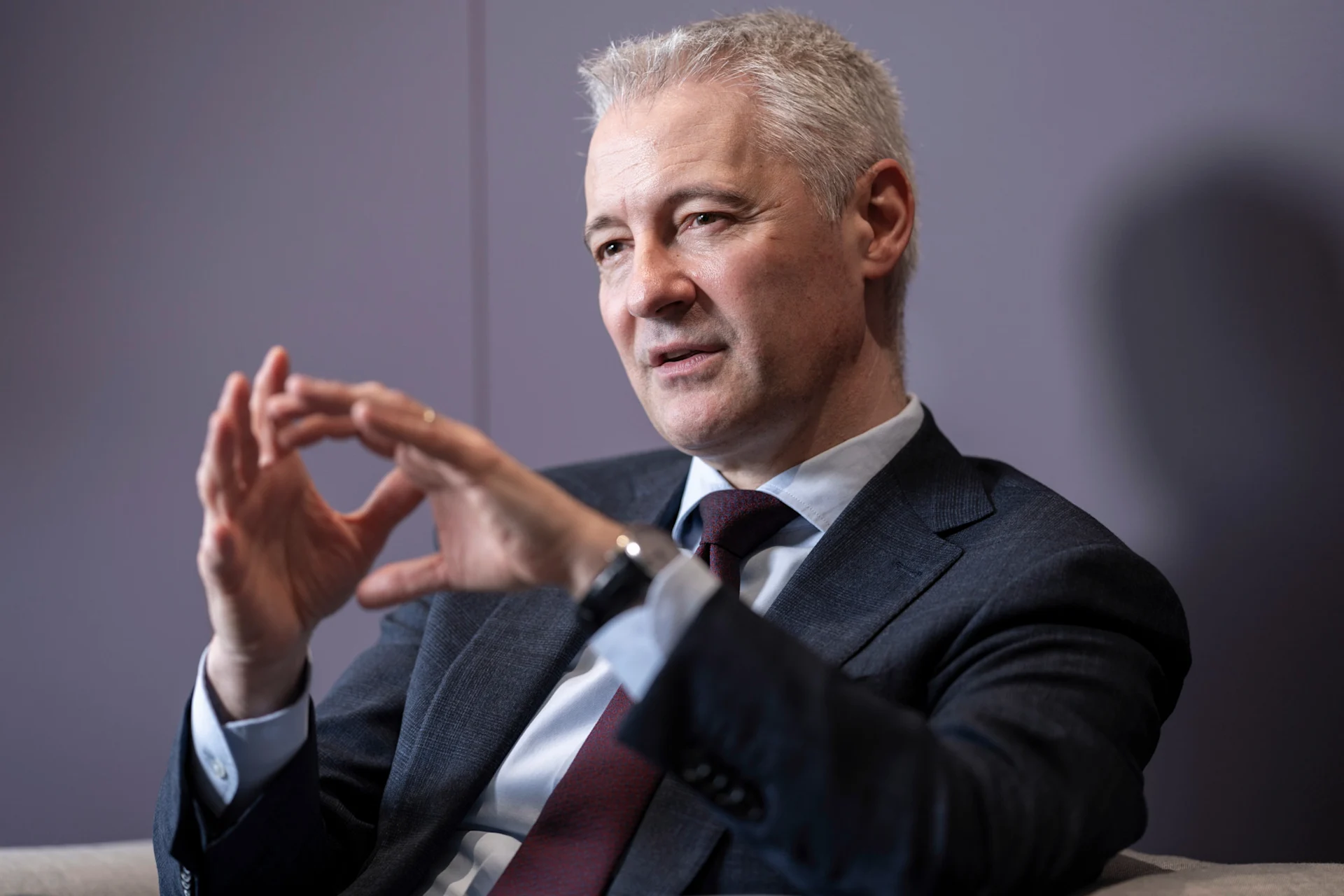
Obituary
Farewell, dear Jules Kyburz
Obituary of Jules Kyburz, former President of the FMC Executive Board, who has died at the age of 93.
navigation

Fabrice Zumbrunnen
Fabrice Zumbrunnen states that it is a moral obligation to advocate for the new CO2 law. The Migros boss explains what the retailer is doing to combat global warming and how it wants to become even more sustainable.
I’ve already had my first vaccination. For me, being vaccinated is an act of solidarity with society as well as of social responsibility. We can only achieve herd immunity against Covid-19 if as many people as possible get vaccinated. Like many others, I look forward, for example, to being able to meet up with my friends again or being able to go to concerts without too many restrictions.
That’s a very personal matter. Each employee must decide for themselves.
That may seem paradoxical. Especially because Migros understands the initiators' motives. The problem lies in the radical nature of the proposals. These would have undesirable consequences.
«We don’t wait for the rules to change.»
Let’s take a concrete example: adopting these two initiatives would result in an almost complete halt to chicken production in Switzerland. The clean drinking water initiative stipulates that feed must be produced on the farm where the animals are kept. But we don’t have enough arable land for that in Switzerland. Through our brand Optigal, we've been working with hundreds of farming families for decades. We've developed an animal husbandry that is known for its sustainability. If the initiative passes, we would have to stop or reconsider our Optigal programme. At the same time, chicken would be imported from abroad, because these requirements don't apply there. Consumers may also buy chicken directly from abroad – from places in which production is not carried out in accordance with our sustainable standards. The result would be paradoxical.
This works with bread grain, and I'm pleased that Jowa is sourcing more and more wheat that has been grown without pesticides. But this doesn’t work for all cultures. With pome fruits, for example, it’s very difficult to completely avoid the use of plant protection products without risking major crop losses. Migros recently launched a project for the sustainable cultivation of apples and pears. Together with the agricultural sector, we want to reduce the use of sprays, promote biodiversity and improve soil quality. These examples show that, wherever possible, Migros takes action independently and is committed to improving sustainability. We don’t wait for the rules to change. And parliament has also become active. It has passed an amendment to halve the use of pesticides by 2027.
I understand this urgency and impatience. I also have children and feel I have a responsibility towards future generations. Unfortunately, however, we live in a world where we increasingly want simple answers to complex problems. The initiative to ban synthetic pesticides, for example, would result in crop failures and production losses. Swiss agriculture would no longer be able to adequately meet the demand of the Swiss population. This would have an impact on the availability of products and on prices. As much as I understand what the initiators are trying to do, the negative effects of both initiatives outweigh the positive ones.
It’s part of a global responsibility we all have towards our planet. Migros has been committed to sustainable development for many years. So it makes sense that we're advocating for the new CO2 law. To achieve the goals, it's important that everyone pulls together. Yes, it will require effort, there will be additional costs that are likely to amount to hundreds of millions of Swiss francs in the long run. But instead of additional costs, we prefer to talk about necessary costs. These are investments that represent a kind of social contract or moral obligation towards our peers and future generations.
Experience shows that, unfortunately, relying only on the goodwill of individuals will not achieve the desired results. The Confederation structures these costs in a socially acceptable manner and is guided by the polluter-pays principle. What would be the alternative? Simply closing your eyes? If we continue as we are, we'll end up in an even more difficult situation. Only extraordinary efforts will allow us to correct global warming or at least slow down its momentum.
The first step is to reach the intermediate stage: to halve greenhouse gas emissions by 2030 compared to 1990. We're on the right track here. Migros, for example, has reduced greenhouse gas emissions by more than 25 percent over the past ten years. After the intermediate step, we have another 20 years to reach climate neutrality. Technological progress will play an important role in this. As this is a societal challenge, it’s quite possible that in 10 to 15 years new solutions will be available or that current technologies will become more efficient.
«Migros has reduced greenhouse gas emissions by more than 25 percent over the past ten years.»
We must do everything to achieve this goal. Otherwise, the earth will continue to get hotter, with dramatic consequences. Of course, we don’t have the answer to everything yet, but the trends I've been watching give me cause for optimism. Migros wants to be one of the leading companies in this transformation and lead by example. This ambition is a great motivation for the whole group.
In each Migros Group company, we have our own specialists who deal with issues relating to improving sustainability. Last year, we also joined the Science Based Targets Initiative to make our contribution to the Paris Climate Agreement. We invest heavily in buildings and now have several shops that generate more energy than they consume. And then we work on logistics by opting for rail as a means of transport wherever possible. Last year, more than 100,000 rail wagons were on the move on behalf of Migros. We're also committed to solutions such as hydrogen trucks or the underground logistics system known as Cargo Sous Terrain.

Here, too, we're working intensively on medium and long-term improvements. Within four years, the greenhouses of Swiss producers are set to be heated using exclusively renewable energy.
Migros always participates financially in such projects. This is the only way we can convince our partners to adopt innovations. Consumers are willing to pay more for a product if its added value is noticeable. We can see this with organic products, for example. In general, the trend in recent years has been towards falling prices. So I don’t think the products will necessarily become more expensive. Especially since it's Migros' mission to offer the best value for money. This is set out in our articles of association.
Yes, we're continuing to invest in quality and price. New products are made cheaper every week. Hundreds of other products will follow in the coming months.
The situation is comparable to last year. Travel business, restaurants and gyms are suffering. Although there have been reopenings. On the other hand, online shops, supermarkets and specialised shops have continued to develop at a very high level.
«Last year, more than 100,000 rail wagons were on the move on behalf of Migros.»
That it is capable of finding good solutions to completely new challenges very quickly. This is thanks to the great commitment of all employees. Also, that our supply systems and logistics are extremely flexible. The solidarity within the company and with all our partners was also remarkable.
Man gewöhnt sich an vieles. Vor nicht allzu langer Zeit waren wir noch von den Bildern aus Asien beeindruckt, wo wir all diese Menschen mit Masken sahen. Bei uns wird es wohl auch normal sein, eine zu tragen, wenn man zum Beispiel erkältet ist. Ausserdem ist der Handschlag verschwunden, was uns fast nicht mehr wundert ... Schliesslich haben wir alle festgestellt, dass soziale Kontakte sehr wichtig für unser Wohlbefinden sind. Mit Familie und Freunden, aber auch mit Arbeitskollegen. Das ist eher beruhigend.
La Chaux-de-Fonds, that’s where I was born and where my family lives.
For food, then in-store. For the rest, I'm shopping more and more online.
Sélection, the products entail considerable know-how and arouse emotions.
Classical music concerts.
I like the beaches of Brittany but this summer I’m going on a hiking holiday in the Engadine.
Tricky…. But Caravaggio is particularly fascinating.